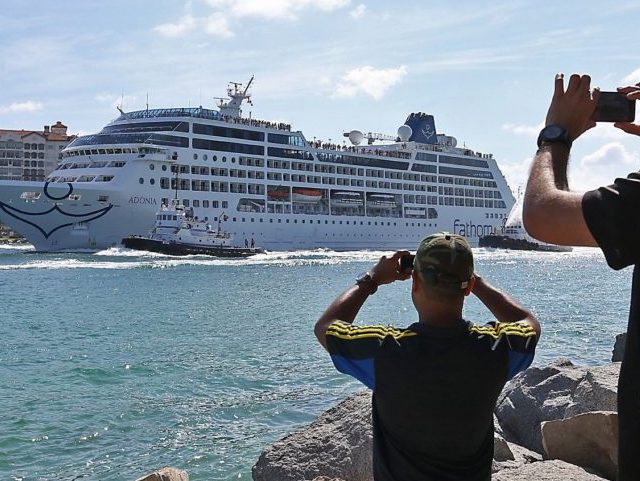Americans who lost land during the 1959 Cuban Revolution will begin to file lawsuits against corporations profiting from their stolen property for the first time this week, a result of President Donald Trump choosing to allow U.S. citizens to exercise that right for the first time in history.
Americans have had the right to sue corporations that do business on property “nationalized” by Fidel Castro following his ascent to dictator of the island under Title III of the Libertad Act of 1996, commonly known as Helms-Burton after the nickname of the bill that preceded it. Every president in its existence before Trump, however, has blocked the implementation of the law, depriving Americans of legal recourse. The Trump administration announced this month it would no longer follow the trend and cease to stand in the way of justice for the Americans who lost their property.
Corporations operating in the United States and profiting from business with the repressive Castro regime have opposed the implementation of Helms-Burton for decades.
The Cuban-American outlet Radio-TV Martí reported on Sunday that Carnival Cruises, the first U.S. company of its kind to send cruise ships to Cuba, would also be the first subject of a lawsuit under Helms-Burton. Carnival ships have used stolen ports currently operated by the Castro regime to dock their ships since 2016, when they began offering lavish voyages to Cuba after the administration of then-President Barack Obama reformed America’s foreign policy to be more favorable to the regime. Carnival was initially so eager to profit from the stolen property that it banned Cuban-Americans from the cruises to appease the Castro regime, a violation of the 1964 Civil Rights Act.
Attorneys for Cuban-American neurosurgeon Javier García-Bengochea – the rightful owner of the Port of Santiago, which Carnival uses to dock its ships along with the port of Havana – said they will file the first Helms-Burton suit in the law’s history on Thursday morning in Miami.
Nick Gutiérrez, an attorney working with the group helping the families who lost property in Cuba during the revolution, told Martí that the lawsuit against Carnival for profiting from using García-Bengochea’s property, which the Castro regime robbed from his family under threat of force in 1960, will be one of hundreds of such lawsuits.
“The one [lawsuit] for the Havana airport is coming, there are lawsuits against Spanish hotel chains in Cayo Coco, in Holguín, Varadero … there will be a good number of demands,” Gutiérrez said, referring to major tourist destinations across the island. He added that he believes many of these cases will not go to trial, as the corporations would prefer to settle and keep their role in using stolen property out of the spotlight.
García-Bengochea has been advocating for Washington to allow Helms-Burton lawsuits for years and discouraging companies from illegally using his property. In conversation with Breitbart News last year, as part of the “Don’t Aid Theft” campaign against business with the Castro regime, García-Bengochea warned that “everything in Cuba is stolen,” as the communist regime banned private ownership of property.
“Any American venture – any venture involving anyone – is almost a necessarily involving stolen property,” he insisted.
The heirs of Rafael Lucas Sánchez Hill, whose sugar cane estate north of eastern Holguín was stolen by the Castro regime shortly after the Revolution, are also planning to sue, according to the Spanish newspaper ABC. The Castro regime built luxury hotels on the property, owned by the Cuban military corporation Gaviota but run by Spanish corporations, including Meliá and Blau. Meliá operates a hotel in Havana that regularly hosts American musical talent for concert experiences costing thousands of dollars, granted by a loophole in U.S. sanctions on the Castro regime that allows for “cultural” exchanges.
The U.S. government sanctioned the Gaviota holding company for its ties to the Cuban military, which is responsible for significant human rights crimes not only on the island but in Venezuela, where the Cuban military is believed to run Caracas’ major political prisons.
“For us to be able to go to trial is a blessing from Heaven because it is going to be 60 years since they stole our property,” Jorge Latour Sánchez, one of over 100 members of the Sánchez Hill family, told ABC. Latour, the newspaper notes, is 84 years old and survived three other brothers who escaped Cuba with him.
The Cuban regime has reacted to the impending Helms-Burton lawsuits with outrage, scorn, and internet memes against National Security Advisor John Bolton, who helped announce the lifting of the ban on the suits this month.
Posting a cartoon doodle reading “Here we don’t fear Burton or Bolton,” Miguel Díaz-Canel, dictator Raúl Castro’s second-in-command,” claimed Friday on Twitter that demanding redress for the victims of the Cuban Revolution robberies was “against international law.”
“Helms-Burton is not a law. It is the denial of law,” Díaz-Canel wrote. “Its articles go against international law. … Cuba is a socialist state of rights.”
The Cuban Foreign Ministry published an extensive screed condemning the lawsuits preemptively.
“Since its entry into force in 1996, the Helms-Burton Act has sought to universalize the economic blockade through brutal and illegal pressures exerted by the United States against third countries, their governments and companies,” the ministry claimed. “It is intended to suffocate the Cuban economy and generate or increase shortages among the population with the purpose of imposing in Cuba a government that serves the interests of the US.”
“This is an aspiration that can only be conceived by the minds of those who identify Cuba s a colonial possession,” the Castro regime declared. “According to the Helms-Burton Act, the economic blockade would be lifted only when that ambition is fulfilled.”

COMMENTS
Please let us know if you're having issues with commenting.